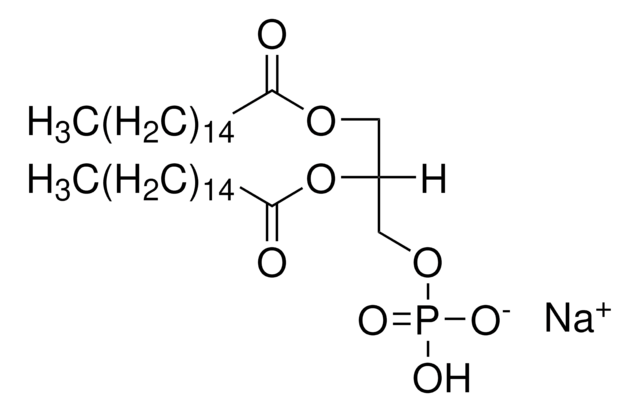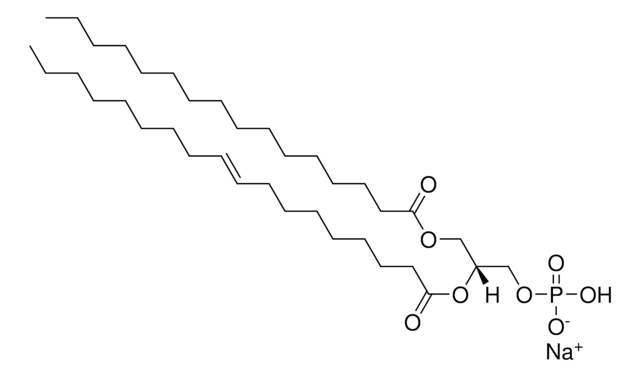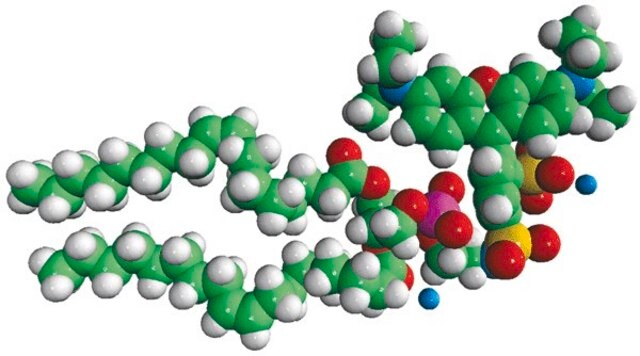840875C
Avanti
18:1 PA
Avanti Research™ - A Croda Brand
Synonym(s):
1,2-di-(9Z-octadecenoyl)-sn-glycero-3-phosphate (sodium salt); DOPA; PA(18:1(9Z)/18:1(9Z))
About This Item
Recommended Products
description
1,2-dioleoyl-sn-glycero-3-phosphate (sodium salt), chloroform solution
Assay
>99% (TLC)
form
liquid
packaging
pkg of 1 × 2.5 mL (840875C-25mg)
pkg of 2 × 20 mL (840875C-1g)
pkg of 2 × 4 mL (840875C-200mg)
pkg of 5 × 4 mL (840875C-500mg)
manufacturer/tradename
Avanti Research™ - A Croda Brand
concentration
10 mg/mL (840875C-25mg)
25 mg/mL (840875C-1g)
25 mg/mL (840875C-200mg)
25 mg/mL (840875C-500mg)
lipid type
cardiolipins
phospholipids
shipped in
dry ice
storage temp.
−20°C
InChI
1S/C39H73O8P.Na/c1-3-5-7-9-11-13-15-17-19-21-23-25-27-29-31-33-38(40)45-35-37(36-46-48(42,43)44)47-39(41)34-32-30-28-26-24-22-20-18-16-14-12-10-8-6-4-2;/h17-20,37H,3-16,21-36H2,1-2H3,(H2,42,43,44);/b19-17-,20-18-;/t37-;/m1./s1
InChI key
KHDHADSEKGCPKW-ZBFGHDQJSA-N
General description
Application
- as a synthetic standard to identify the position of PA after iodine staining in phosphatidic acid assay by thin-layer chromatography (TLC)
- as a lipid standard in the optimization of the liquid chromatography−mass spectrometry (LC-MS) method conditions
- as a lipid standard in radiolabeling analysis of phospholipids
Biochem/physiol Actions
Packaging
Legal Information
also commonly purchased with this product
Signal Word
Danger
Hazard Statements
Precautionary Statements
Hazard Classifications
Acute Tox. 3 Inhalation - Acute Tox. 4 Oral - Aquatic Chronic 3 - Carc. 2 - Eye Irrit. 2 - Repr. 2 - Skin Irrit. 2 - STOT RE 1 - STOT SE 3
Target Organs
Central nervous system, Liver,Kidney
Storage Class Code
6.1D - Non-combustible acute toxic Cat.3 / toxic hazardous materials or hazardous materials causing chronic effects
WGK
WGK 3
Flash Point(F)
does not flash
Flash Point(C)
does not flash
Regulatory Listings
Regulatory Listings are mainly provided for chemical products. Only limited information can be provided here for non-chemical products. No entry means none of the components are listed. It is the user’s obligation to ensure the safe and legal use of the product.
PRTR
Class I Designated Chemical Substances
ISHL Indicated Name
Substances Subject to be Indicated Names
ISHL Notified Names
Substances Subject to be Notified Names
JAN Code
840875C-25MG:4548174018019
840875C-BULK:
840875C-1G:4548174018026
840875C-500MG:4548174018040
840875C-200MG:4548174018033
840875C-VAR:
Certificates of Analysis (COA)
Search for Certificates of Analysis (COA) by entering the products Lot/Batch Number. Lot and Batch Numbers can be found on a product’s label following the words ‘Lot’ or ‘Batch’.
Already Own This Product?
Find documentation for the products that you have recently purchased in the Document Library.
Customers Also Viewed
Our team of scientists has experience in all areas of research including Life Science, Material Science, Chemical Synthesis, Chromatography, Analytical and many others.
Contact Technical Service
















